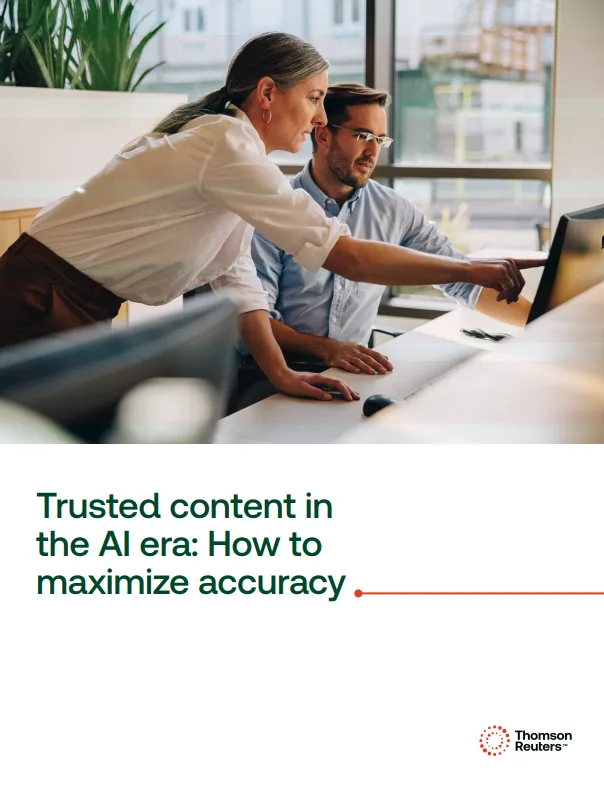Meet three attorney-editors who curate and validate the content that powers the professional-grade AI solution
Highlights
- CoCounsel Legal is differentiated by the hundreds of veteran attorney-editors who build, monitor, and improve the system.
- Unlike many other legal AI providers, these experts ensure CoCounsel Legal accesses information correctly, ethically, and efficiently.
- Three attorney-editors with backgrounds in data privacy, commercial transactions, and litigation bring real-world experience to the AI's development.
All providers of legal AI solutions emphasize how fast their system works, the services it offers, and how much time it saves. But most legal AI providers lack a deep bench of experts to help build the system, monitor its functions, continually make improvements, and consistently push the technology to the next level.
That’s the CoCounsel Legal difference. One reason why it’s the industry’s most comprehensive and reliable AI legal solution is because of the attorney-editors behind the scenes. Hundreds of veteran legal professionals maintain the data and ensure CoCounsel Legal accesses this information correctly, ethically, and efficiently.
So, who are these professionals? Meet three of them.
Jaime Barwig is a Practical Law senior legal editor on the data privacy and cybersecurity team. At Bass, Berry & Sims PLC, she was a partner focusing on privacy compliance, data management, regulatory strategy, and technology transactions, advising companies on global data privacy matters.
Janet Brown is a Practical Law senior legal editor and part of the commercial transactions team. She was a regional general counsel for CEVA Logistics, responsible for commercial, corporate, litigation, and risk management for North America and cargo claims for the global organization. She was also an attorney in the healthcare practice group at BakerHostetler.
Brandon Moss is a Practical Law senior legal editor on the litigation team. He was a partner at Murphy, Hesse, Toomey & Lehane, LLP, where he focused on civil litigation, appellate practice, employment law, and public law. He was also a judicial law clerk with the Atomic Safety & Licensing Board Panel of the U.S. Nuclear Regulatory Commission.


Jump to ↓
When there’s no time to learn new tools
Getting to square one and beyond
Building content you can trust
Witnesses to change
One thing these attorney-editors share is perspective. Having all worked in private or public practice, they’ve seen a significant shift occur in legal technology over the past two decades.
Barwig recalls technology in some of her earlier jobs consisting mostly of Word drafting and editing, video conferencing, and back-office functions. Brown remembers that “when I started in-house, Docusign wasn’t being consistently used. Legal technology was mostly there to support administrative tasks and for tasks that were sort of floating in the background.”
All of that has changed, and rapidly. “In the last two to three years, there’s been an explosion in legal technology, with AI leading the charge,” Moss says.
When there’s no time to learn new tools
Brown describes the evolution of legal technology use as being a “crawl, walk, run” process for many law firms and legal departments. “For some lawyers, AI is not in the cards yet. Some people are waiting for features to develop more before doing full adoption. And there are those who aren’t sure how to engage yet, and don’t know what specific use cases they can put it to.”
She is part of a CoCounsel customer pilot program that engages with subscribers “who have not used it as much as they thought they would,” she says. “We’re looking at their feedback and seeing where the hurdles are. What’s preventing them from engaging further?”
Time constraints, for one thing. “Being at a law firm, or being in-house, you’re very busy and maybe you don’t have any time to set aside, even a couple hours to experiment with CoCounsel, to run a compare function and see how accurate it is,” she says.
Her team is working to create tailored use cases “so we can sharpen the saw for them. We can experiment and ideate for them, and help them to train on those use cases, and create mini workflows.”
“You need a way to help remove the fear of experimentation,” she adds, “to try using it on their actual work and see what kind of outputs they get, and which ones are usable. The ones who do are surprised — in a good way — about what they find.”
Getting to square one and beyond
One of CoCounsel Legal’s most rewarding functions is its ability to guide users to the right starting point. This could be a suggestion for drafting a document or mapping out due diligence on an upcoming acquisition.
In the past few years, there has been a wave of data privacy consumer laws enacted. While similar in intent and tone, each piece of legislation has important, nuanced distinctions. It has been challenging for lawyers handling data privacy litigation, “because of the sheer volume, having to assess these 20-plus laws that are very similar but just different enough,” Barwig says. “CoCounsel helps pinpoint what the variances are and then lets me dig into those. It addresses a pain point, and it’s become a real time saver.”
For Brown, using CoCounsel means “not getting stuck anymore. In the past, running into an area of law that was not in your wheelhouse meant calling a coworker if you were fortunate enough to have one who knew that area. If not, it was maybe a call to outside counsel or hours of research.” Now she can offer CoCounsel a general idea of what she needs and gets multiple suggestions for a starting place or best practices.
“You can prompt CoCounsel and it will search across practice areas within Practical Law and pull together a bespoke toolkit,” she says. “It can really help you quickly get a lay of the land, and also help you work cross-functionally.”
Building content you can trust
One of an attorney-editor’s vital tasks is to ensure the accuracy of outputs that CoCounsel Legal generates. As a recent cases have shown, a lawyer who uses generative AI (GenAI) to produce a brief, but doesn’t verify that all cited cases are accurate, will face serious financial, reputational, and ethical risks.
The “hallucinated” output is a flaw of many public GenAI platforms. Moss has run searches on such platforms and “even lately, they’ve continued to give me cases and rules where, right off the bat, I said ‘those aren’t real.’” For instance, he was preparing for a speaking engagement in 2024 and asked for relevant cases on the topic. The GenAI system returned one titled “Yelp v Local Business LLC,” with the court’s decision dated in 2025. “I immediately said to myself, ‘There’s a problem here!’ The LLM did acknowledge and apologize for the error that it gave me, but only because I first recognized the hallucination and then proactively brought it to the LLM’s attention and asked for the LLM to verify accuracy (which it could not).”
By contrast, “when you use CoCounsel or Deep Research, you’re assured that it’s grounded in trusted content. It will give you cites and hyperlinks to sources within the Westlaw universe, or in Practical Law content: something that you can independently verify,” Moss says. “We instill our experience and our judgment when creating Practical Law content and evaluating outputs.”
Centering the accuracy of outputs helps define CoCounsel Legal, especially compared with ChatGPT and other publicly available LLMs. Attorneys are on thin ice when a public LLM “isn’t sure about a query or is making an inference. Then it might make things up,” Barwig says. “And it can sound so confident when it makes things up.”
“Whereas with CoCounsel we’ve deliberately designed it to be grounded in Practical Law content and in actual statutes and regulations,” she adds.
Another aim: making sure that the “voice” of CoCounsel is “reliable, responsible, and professional,” Brown says. “The way that it responds to you is a little more dialed back than what you’ve seen on other LLMs.”
She has been working to develop, evaluate, and train CoCounsel’s responses. “In our development and testing, the issue isn’t hallucinations — you’re not getting many of those now. We’ll fail CoCounsel [in a test] because it didn’t strike the right tone, or it didn’t pick up on the subtlety in the prompt that you wanted it to.”
Agentic AI delivers results
The promise of agentic AI could be “a huge game changer for transactional work,” Brown says. With agentic AI, users can provide CoCounsel Legal with minimal context or prompts. The system intuitively initiates queries and delivers outputs based on its own decision processes.
“CoCounsel will be able to run with the materials you give it, and it should be able to pull Practical Law materials and do research on its own,” she adds. “You can produce some really incredible work, which is about as shelf-ready as I’ve seen to date. Agentic AI coming down the pipeline is a very exciting development.”
As former practicing attorneys, our editors understand that clients often prefer a concise, trusted recommendation over lengthy memos. That’s what agentic AI stands to deliver.
Moss says he expects to see expanded litigation drafting skills for CoCounsel in the future. “There’s a large universe of items drafted in litigation. As CoCounsel evolves, I expect that more types of documents will be available. I imagine the trajectory will just keep going upward.”
Building the legal future
The attorney-editors share one regret: they weren’t able to use CoCounsel Legal earlier in their careers. “I wish I’d had it when I was in practice,” Barwig says. “I really see the utility and value in it.”
Moss even feels a bit jealous whenever the latest CoCounsel Legal enhancement gets rolled out. When he was in practice, he says, “there were times when I’d get a call from a particular client every Friday at 4:30. He would always throw something at me. For so many of those times, if I could have plugged the issue into Deep Research, I could have given him the answer in minutes.”
Experience professional-grade AI in CoCounsel Legal, grounded in trusted legal content and validated by expert attorney-editors.

CoCounsel Legal
Work smarter with CoCounsel, seamlessly integrated with Westlaw, Practical Law, Microsoft 365, and DMS partners
Go professional-grade AI ↗










